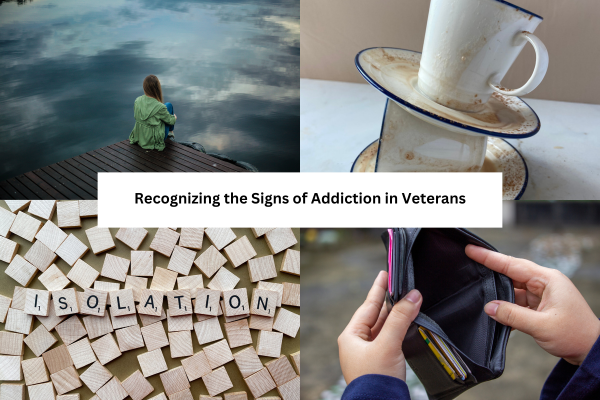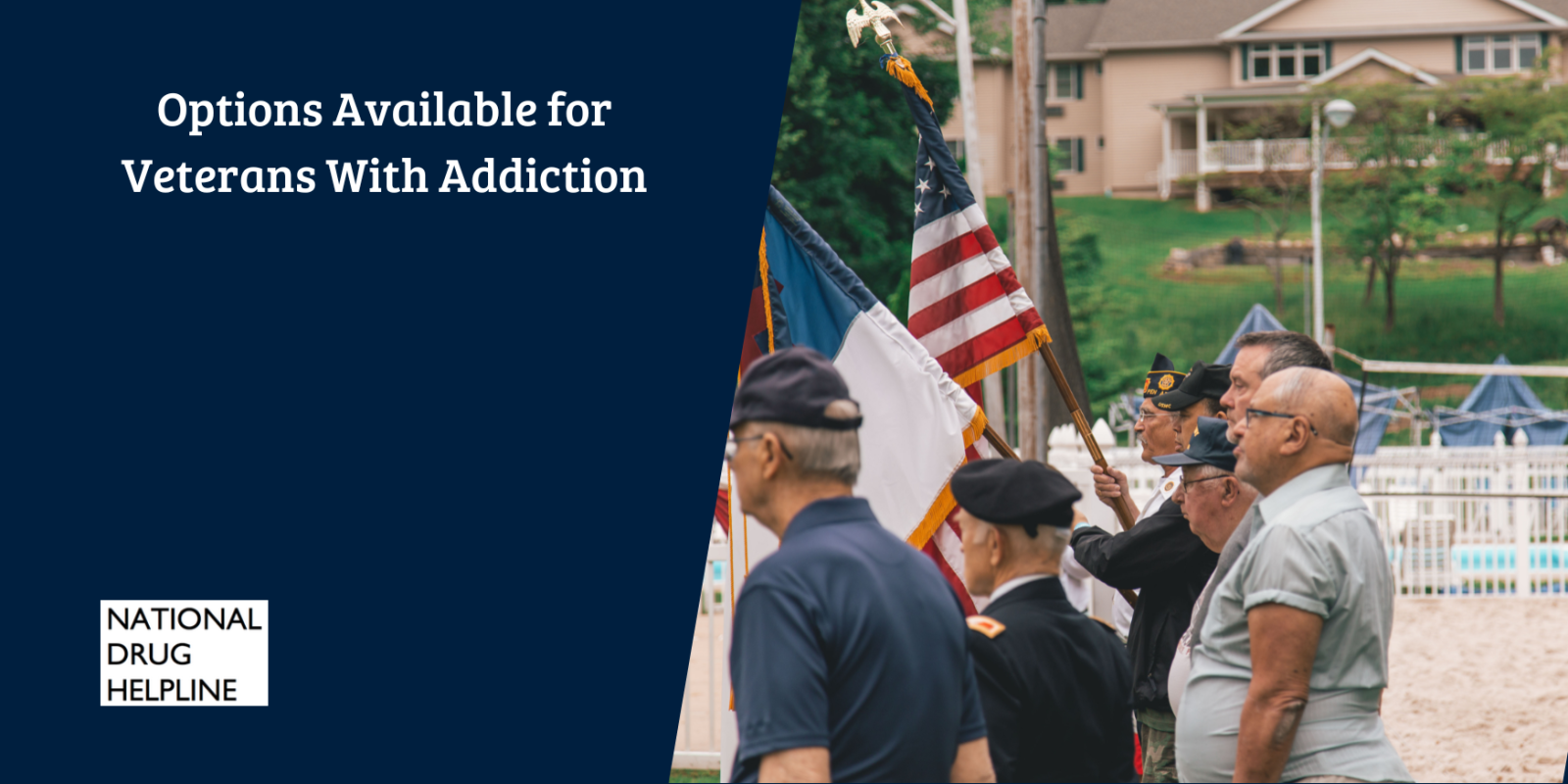Veterans and addiction have been linked together frequently, and has now become a pressing public health concern. This may be because veterans often face unique challenges, including combat-related trauma, chronic pain, and the stress of reintegration into civilian life. All og these increase their risk of developing substance use disorders.
In fact, studies have reported that the rate of addiction among veterans is significantly higher than that in the general population. [1] The addiction in veterans may be to any substance, such as alcohol, prescription opioids, or illicit drugs. Fortunately, there are a variety of evidence-based treatment options available, including recovery programs and support services. They can help veterans overcome addiction and reclaim their health as well as their well-being.
Why Veterans Are at Higher Risk for Addiction
Combat Trauma and PTSD
A well-established risk factor among veterans for addiction is post-traumatic stress disorder (PTSD). A history of exposure to combat, loss of fellow service members, and traumatic experiences can lead to PTSD. Many veterans with PTSD often self-medicate with alcohol or drugs to cope. Studies have shown that veterans with PTSD have a higher risk of developing substance use disorders than those without PTSD. [2]
Chronic Pain and Prescription Drug Use
A large majority of veterans suffer from chronic pain resulting from combat injuries or strenuous physical training. To deal with chronic pain, many veterans turn to prescription opioids. [3] However, opioids have a high risk of dependence and misuse. This can lead to opioid addiction, which has become a serious issue in veteran communities.
Reintegration and Social Challenges
It can be very difficult to adjust to civilian life after service. Veterans often struggle with employment, housing, and relationships. These challenges can lead to feelings of isolation and depression. In many cases, it may even increase the addiction to alcohol or drugs as a coping mechanisms.
Military Culture and Alcohol Use
It is well known that there is a culture of drinking within the military. However, this can also carry over into post-service life and contribute to high rates of alcohol misuse. Furthermore, social norms often normalize heavy drinking. This can make it harder for veterans to recognize the problem.
Common Substances of Misuse Among Veterans
- Alcohol: One of the most frequently misused substances among veterans is alcohol. It is taken as a means to provide relief from stressful thoughts and also as a way to participate in social settings.
- Opioids: Chronic pain is an issue frequently encountered in veterans after injury attained in the field. This has led to addiction to both prescription painkillers and illicit opioids like heroin.
- Stimulants: To maintain energy or to remain focused, some veterans also misuse stimulants.
- Cannabis: Veterans may also increasingly misuse cannabis both recreationally and for self-medication of anxiety or pain. While some may do it under medical guidance, many obtain it through illegal means.
Recognizing the Signs of Addiction in Veterans
To spot the early signs of substance misuse, family, friends, and healthcare providers play an important role. Some early signs may include:
- Increased tolerance or withdrawal symptoms
- Neglect of responsibilities at home or work
- Changes in mood, including irritability or depression
- Social withdrawal and isolation
- Legal or financial issues related to substance use

Treatment Options for Veterans with Addiction
VA Substance Use Disorder Programs
The U.S. Department of Veterans Affairs (VA) has offered a comprehensive addiction treatment programs that is tailored to meet the needs of veterans. These include:
- Medical detoxification
- Inpatient and outpatient rehab programs
- Medication-assisted treatment (MAT) for opioid or alcohol dependence
- Individual and group counseling
These treatment programs also integrate mental health services. This ensures co-occurring disorders such as PTSD and depression are addressed alongside addiction.
Evidence-Based Therapies
To ensure an effective recovery, behavioral therapies should also be included such as:
- Cognitive Behavioral Therapy (CBT): This helps veterans reframe negative thoughts and behaviors.
- Motivational Interviewing (MI): This is a type of counselling that encourages veterans to commit themselves to positive changes.
- Prolonged Exposure Therapy: This can be especially effective for veterans with PTSD-related substance use.
Medication-Assisted Treatment (MAT)
MAT is a form of treatment that combines counseling with medications such as buprenorphine, methadone, or naltrexone. These medications work by reducing cravings and withdrawal symptoms. For alcohol addiction, beneficial medications include acamprosate or disulfiram.
Peer Support and Veteran Recovery Groups
Peer support is particularly valuable for veterans. This is because they often feel most understood by those with similar experiences. There are certain programs such as Alcoholics Anonymous (AA), Narcotics Anonymous (NA), or veteran-specific support groups, that provide a sense of community and accountability.
Residential Rehabilitation Programs
Some veterans may benefit from 24/7 care through structured, live-in rehab programs. These programs help attain long-term recovery through combination therapy, peer support, and skills training.
Holistic and Alternative Therapies
Many treatment centres also integrate non-traditional or alternative therapies to help veterans cope with stress and trauma. Some of them are
- Yoga and meditation
- Equine therapy
- Art and music therapy
- Physical fitness and nutrition counselling
The Role of Families in Recovery
To help veterans recover from addiction, families play a critical role. Family members can provide emotional support, encourage treatment, and participate in family therapy sessions. By educating families about addiction, veterans can receive proper help. This is because once families understand the struggles of their loved ones, they foster a more supportive environment for recovery.
Conclusion
The connection between veterans and addiction is complex. It is shaped by combat experiences, chronic pain, reintegration challenges, and cultural factors. However, with the right treatment options that may range from VA services and evidence-based therapies to peer support and holistic approaches, recovery is possible.
Supporting veterans recovering from drug and alcohol addiction requires compassion, understanding, and access to comprehensive care. It is essential to address both the root causes and the ongoing needs of recovery. By doing so, we can ensure that those who have served the nation receive the support they deserve to rebuild healthier and more fulfilling lives.
References
| ↑1 | Hoggatt, Katherine J., et al. “Prevalence of substance misuse among US veterans in the general population.” The American journal on addictions 26.4 (2017): 357-365. |
|---|---|
| ↑2 | Bowe, Adina, and Robert Rosenheck. “PTSD and substance use disorder among veterans: Characteristics, service utilization and pharmacotherapy.” Journal of Dual Diagnosis 11.1 (2015): 22-32. |
| ↑3 | obscha, Steven K., et al. “Correlates of prescription opioid initiation and long-term opioid use in veterans with persistent pain.” The Clinical journal of pain 29.2 (2013): 102-108. |

